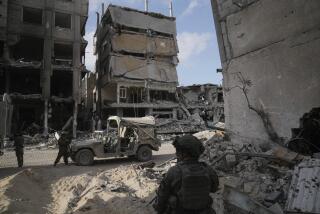Bombers kill at least 17 in Iraq
BAGHDAD — Suicide attackers struck near a Shiite Muslim mosque north of Baghdad and a checkpoint west of the Iraqi capital on Monday. At least 17 people died in attacks nationwide.
The violence was concentrated in former Sunni Arab insurgent strongholds that saw a sharp decline in bloodshed after tribal leaders turned against the militant group Al Qaeda in Iraq. Despite the relative calm, recent bombings have raised concerns about a resurgence of violence as the U.S. military scales back its presence, with a full withdrawal planned by the end of 2011.
The attacks, which mainly targeted checkpoints and Iraqi police, also highlighted the weaknesses in the Iraqi security forces, which are struggling to prove they are ready to take over from the Americans.
The deadliest attack was by a suicide car bomber who struck a line of vehicles waiting to be inspected before crossing a bridge near Ramadi, capital of Anbar province, police said.
The blast set half a dozen other vehicles ablaze, killing three policemen and five civilians and wounding 16 people, said police and hospital officials, who spoke on condition of anonymity because they were not allowed to release the information.
Hours later, a suicide bomber blew himself up at the gate of a Shiite mosque in Baqubah, 35 miles northeast of Baghdad, killing at least five people -- three policemen and two worshipers -- and wounding 20, police and hospital officials said.
Maj. Ghalib Karkhi of the provincial police said the bomber was forced to detonate his explosives prematurely after guards discovered his explosives vest.
The mainly Sunni city of Baqubah also has been hit by several bombings despite an overall decline in violence.
In Baghdad, a bomb destroyed a police car, killing one officer and two civilians and wounding eight, police said. Another bomb killed a driver as he approached a military checkpoint in the Sadr City district.
More to Read
Sign up for Essential California
The most important California stories and recommendations in your inbox every morning.
You may occasionally receive promotional content from the Los Angeles Times.










